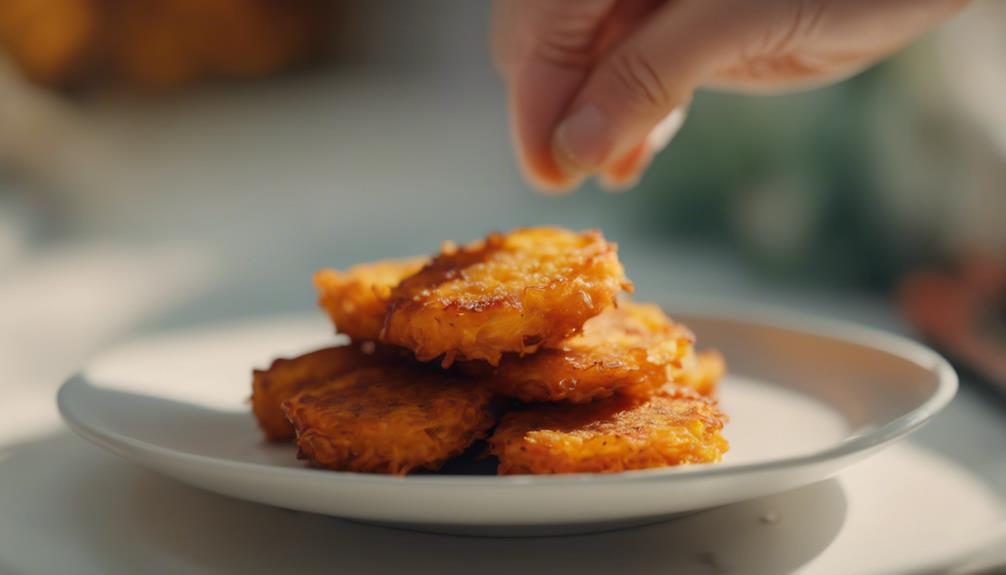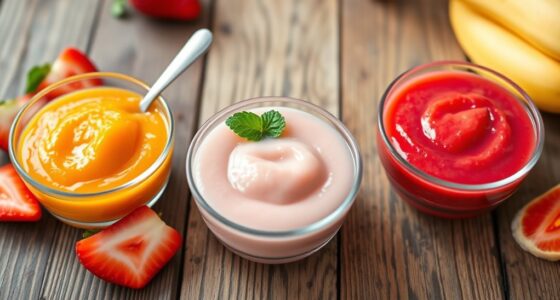When you’re looking for easy and healthy meals for your baby, consider starting with homemade options. Start introducing soft or pureed foods at 6 months, focusing on iron-rich choices like egg yolk and liver. Choose nutrient-dense options such as sweet potatoes and butternut squash as ideal first foods. Gradually introduce different textures and flavors around 9 months, including dishes like flaky salmon and roasted vegetables. Encourage independence with finger foods like fruits and pasta to help promote self-feeding skills. Ensure food safety by cooking items thoroughly and properly storing them. As you delve deeper, you’ll find valuable tips for creating homemade baby food.
Key Takeaways
- Start with nutrient-dense foods like sweet potatoes and butternut squash for simple and nutritious options.
- Incorporate iron-rich foods such as egg yolk and liver to prevent anemia in babies.
- Offer a variety of flavors and textures by transitioning from purees to soft solids.
- Introduce finger foods for independence and exploration, promoting self-feeding skills.
- Store homemade baby food in sealed containers in the fridge for short-term use and freeze unused portions for longer storage.
Starting Solid Foods
When your baby is around 6 months old and displaying signs of readiness, it's time to start introducing solid foods. This stage is important for your baby's development as they move from a milk-only diet to more diverse options.
Homemade baby food is a great choice during this period, offering nutrient-dense options that you can tailor to your baby's needs. By making your own baby food, you have control over the ingredients, ensuring that your little one receives essential nutrients without added preservatives or sugars.
As you begin this journey of starting solid foods with your baby, remember to start with soft or pureed options to make it easier for them to eat. Iron-rich foods like egg yolk, liver, and pureed meats are excellent choices to introduce first, helping to prevent anemia in babies.
It's important to introduce new foods gradually and watch out for any signs of allergies or sensitivities as your baby explores different flavors and textures.
Best First Foods for Babies

To introduce your baby to solid foods, consider starting with iron-rich options like egg yolk and liver, ideal for preventing anemia and supporting their growth and development.
When choosing foods for your little one, opt for nutrient-dense options that are gentle on their developing digestive system.
Some excellent first foods for babies include:
- Sweet Potatoes: Rich in essential vitamins and minerals, sweet potatoes are easy to digest and offer a naturally sweet flavor that babies tend to enjoy.
- Butternut Squash: Packed with nutrients like beta-carotene and vitamin C, butternut squash is a great choice for introducing vegetables into your baby's diet.
- Baby Led Weaning: This approach encourages self-feeding and the exploration of different textures, helping babies develop their motor skills and taste preferences.
Transitioning at 9 Months

Consider broadening your baby's palate at 9 months by introducing:
- Flaky salmon
- Ground beef
- Roasted vegetables
- Baked potatoes
- Pasta dishes
These foods for babies can provide a variety of flavors and textures to keep your little one engaged during mealtime. Incorporating finger foods like banana slices and well-cooked pasta can also help promote independent eating skills through baby-led weaning.
When preparing meals, focus on flavor combinations using wholesome ingredients. Fresh herbs and spices can add depth to your baby's dishes without the need for added salt or sugar. Remember to introduce new flavors gradually, keeping an eye on your baby's tolerance level.
As you progress at 9 months, encourage exploration of different tastes while ensuring a balanced diet.
Introducing Textures and Flavors
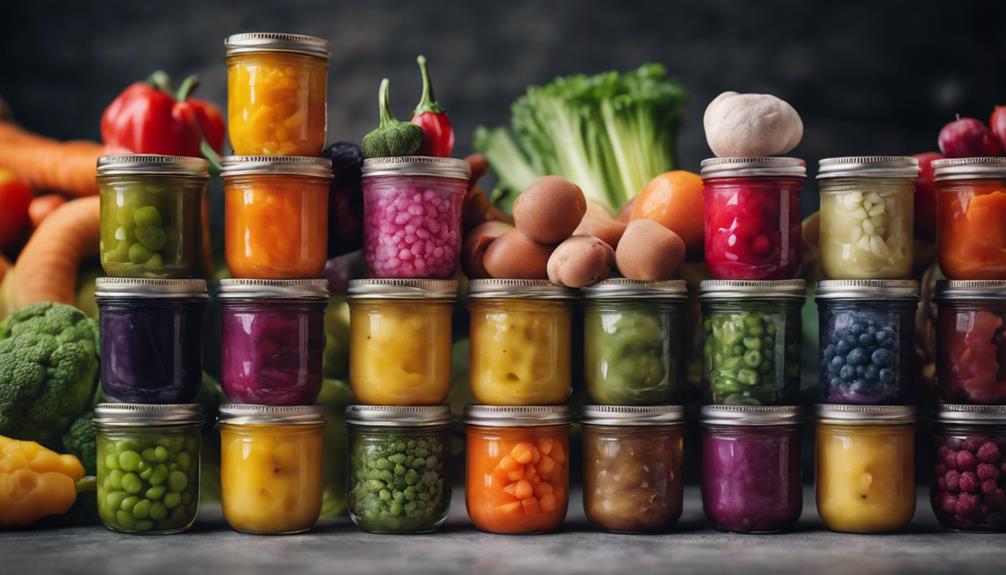
Enhance your baby's culinary journey by gradually introducing a variety of textures and flavors to aid in developing their taste preferences and fostering healthy eating habits. As your little one progresses from purees to solid foods, incorporating different textures like mashed, minced, and soft finger foods can play an important role in enhancing their sensory experiences.
Experimenting with a range of flavors such as herbs, spices, and mild seasonings can also help expand your baby's palate and interest in food. By exposing your baby to diverse textures and flavors early on, you can help prevent picky eating habits and promote a well-rounded diet.
Shift from purees to soft solids to improve oral motor skills
Offer a variety of textures like mashed, minced, and soft finger foods for sensory development
Experiment with different flavors such as herbs, spices, and mild seasonings to expand your baby's palate
Finger Foods for Independence
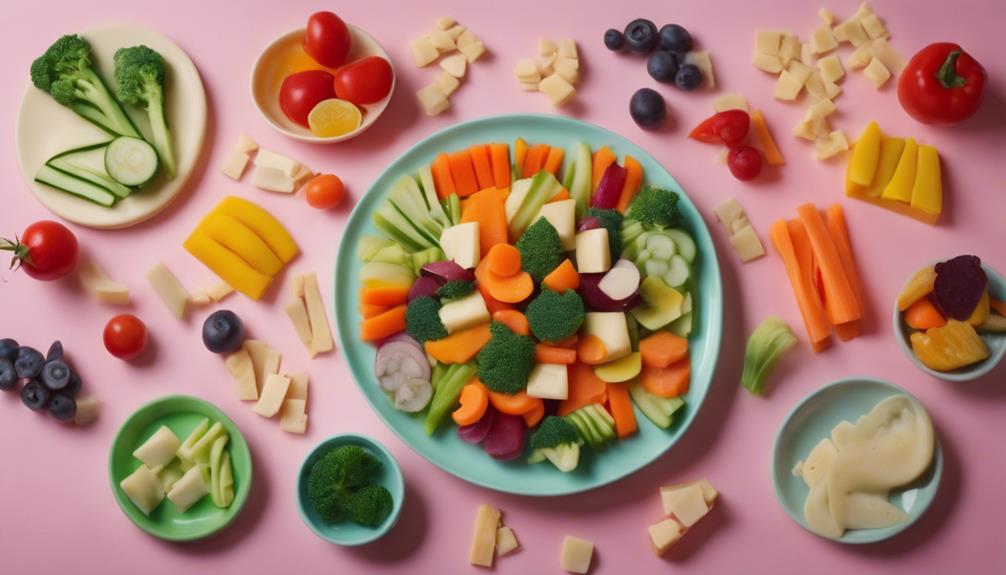
When it comes to introducing finger foods for independence to your little one, you're helping boost their self-feeding skills and encouraging exploration of different textures.
Bite-sized pieces of soft fruits, cooked veggies, and pasta can be great options to promote healthy snacking habits.
Don't forget to offer dips like hummus or yogurt to make the finger foods more appealing and add extra nutrition to your baby's diet.
Boosting Self-Feeding Skills
To enhance your baby's self-feeding skills, introduce finger foods that promote independence and hand-eye coordination. Finger foods play a vital role in developing your baby's ability to feed themselves and refine their motor skills.
Here are some suggestions to get you started:
- Banana Slices: Soft and easy to grasp, banana slices are perfect for little fingers learning to pick up food independently.
- Well-Cooked Pasta Pieces: Cooked until soft, pasta pieces provide a great opportunity for your baby to practice their hand-eye coordination while enjoying a tasty meal.
- O-Shaped Cereal: The familiar shape of O-shaped cereal makes it a fun and engaging option for babies to pick up and eat on their own.
Encouraging Exploration of Textures
Introduce a variety of textures through finger foods to encourage your baby's exploration and independence. Finger foods play an essential role in developing your baby's fine motor skills and fostering independence.
By offering a range of textures, you allow your little one to explore different sensations, aiding in their sensory development.
Soft cooked vegetables, fruits, and well-cooked pasta are excellent options for introducing finger foods. These foods provide varying textures that can help your baby learn to chew and manipulate food in their mouth.
Additionally, incorporating dips like hummus or guacamole can make finger foods more appealing and enjoyable for your baby.
Promoting Healthy Snacking
Encourage your baby's independence by offering healthy snacking options that promote self-feeding skills through finger foods. Introducing your little one to a variety of textures and tastes can enhance their palate and overall eating experience.
Consider these options to help your baby develop their self-feeding abilities:
- Banana Slices: Easy to grab and full of essential nutrients, banana slices are a great finger food for babies to practice their fine motor skills.
- O-shaped Oat Cereal: These cereals are perfect for tiny fingers to pick up and munch on, aiding in hand-eye coordination development.
- Bite-sized Pasta Pieces: Providing small pasta pieces encourages babies to use their pincer grasp, improving their self-feeding skills.
Remember to always supervise your baby when offering finger foods to prevent any choking hazards.
Safety Tips for Mealtime

When it comes to mealtime safety for your baby, it's important to prevent choking hazards.
Always supervise your little one closely during feeding to make sure they're eating safely and avoid any potential risks.
Remember to cut food into small, manageable pieces and steer clear of hard or sticky foods that could pose a choking threat.
Choking Hazard Prevention
To prevent choking hazards during mealtime, always avoid offering infants hard or crunchy foods like raw carrots.
When feeding your baby, it's important to take necessary precautions to guarantee their safety.
Here are some tips to help you prevent choking incidents:
- Cut foods into small, manageable pieces to reduce the risk of choking.
- Be cautious with small, round foods like grapes that can pose a choking hazard for babies.
- Supervise closely while your baby is eating to intervene promptly if needed.
Proper Food Temperature
Maintaining safe food temperatures is essential for guaranteeing mealtime safety and preventing foodborne illnesses. It's vital to serve hot foods at temperatures above 140°F to inhibit bacterial growth and cold foods below 40°F to reduce the risk of foodborne illnesses.
Using a food thermometer to check the internal temperature of foods, especially meat and poultry, is highly recommended to make sure they're cooked thoroughly. Leftovers should always be reheated to at least 165°F to make certain they're safe to consume.
Additionally, it's important to avoid leaving perishable foods, such as meat or dairy products, at room temperature for more than 2 hours to prevent spoilage and contamination.
Homemade Baby Food Essentials

Gather essential supplies like a food processor, cutting board, knife, spatula, spoon, and storage containers to start making homemade baby food. Having these items ready will make the process easy and efficient.
When preparing recipes for babies, using a food processor can help in blending and pureeing ingredients to a suitable consistency for your little one.
To make homemade baby food, you'll need to make sure you have the necessary ingredients like meat, veggies, fruit, fats, salt, and liquids. Combining these elements in the right proportions is vital to provide a balanced meal with proteins, fats, and carbohydrates for your baby's nutrition.
Remember to adjust the consistency of the homemade baby food by adding liquids such as water, bone broth, breast milk, or fermenting liquid. These additions can help tailor the food to suit your baby's preferences and stage of development.
Storing Homemade Baby Food
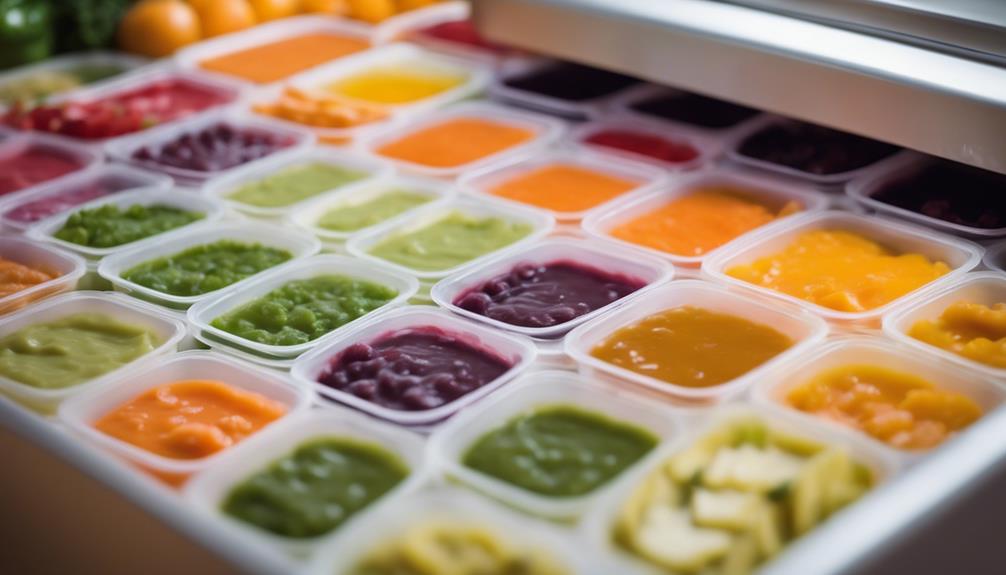
How can you guarantee the freshness and convenience of storing homemade baby food?
To maintain freshness and safety, refrigerate homemade baby food in a sealed container for up to three days.
For longer storage, freeze homemade baby food in ice cube trays for up to 3 months, allowing for convenient portioning.
Store unused homemade baby food in ice cube trays for quick and easy access to small portions when needed.
To thaw frozen baby food cubes, place them in the refrigerator overnight.
This method helps preserve the nutrients and ensures safe consumption for your baby.
Tips for Making Baby Food
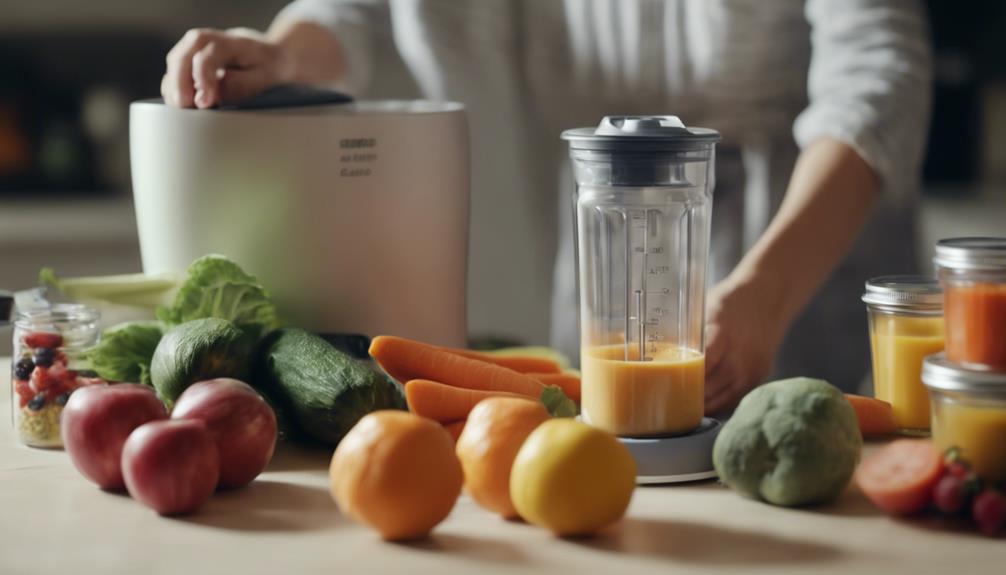
When preparing homemade baby food, prioritize using nutrient-dense ingredients like veggies and meats to guarantee your little one receives essential nutrients. To make the process smoother, here are some tips for crafting nutritious meals for your baby:
- Start with Soft or Pureed Foods: Begin with soft or pureed foods like sweet potatoes that are easy for babies to pick up and feed themselves.
- Adjust Consistency: Modify the texture of baby food by adding liquids such as water, breast milk, or bone broth to achieve the desired consistency.
- Storage Tips: Store homemade baby food in sealed containers in the fridge for up to three days. For longer storage, freeze unused portions in ice cube trays for up to three months.
These tips will help you create delicious and nutritious homemade baby food, ensuring your little one gets the best start with solid foods.
Frequently Asked Questions
What Is the Healthiest Way to Make Baby Food?
To make baby food healthily, you should use fresh, organic ingredients. Avoid chemicals by making it at home. Control ingredients to skip added sugars, salt, and preservatives. Steam or roast fruits and veggies for best nutrients.
What Are Easy Foods for Babies to Eat?
When it comes to feeding your little one, opt for soft, pureed foods like apple, avocado, and banana puree. These simple options make eating a breeze for babies, helping them grow strong and healthy.
What Are Healthy Eating Ideas for Babies?
When it comes to healthy eating ideas for babies, introduce nutrient-dense foods like veggies and meats for best growth. Start with homemade purees over commercial options and delay grains, refined sugar, and nuts until after the first birthday.
What Can Be Mixed With Baby's Regular Meals to Make Them More Nutritious?
To make baby's regular meals more nutritious, mix in pureed vegetables like spinach for a veggie boost. Add healthy fats such as avocado to aid growth. Incorporate proteins like pureed chicken for muscle development. Enhance iron intake with foods like pureed beef.
Conclusion
To sum up, homemade baby food recipes provide a simple and nutritious option for feeding your little one.
By starting with the best first foods and gradually introducing textures and flavors, you can help your baby develop healthy eating habits.
Remember to follow safety tips for mealtime and store homemade baby food properly.
With a little effort and preparation, you can guarantee your baby gets the best start to a lifetime of good nutrition.
So why not give it a try today?



